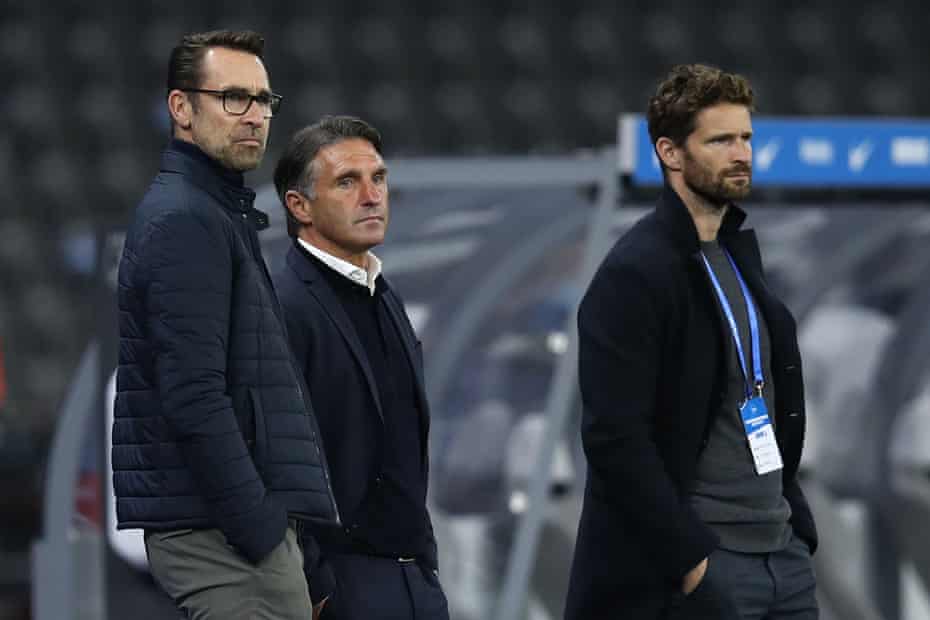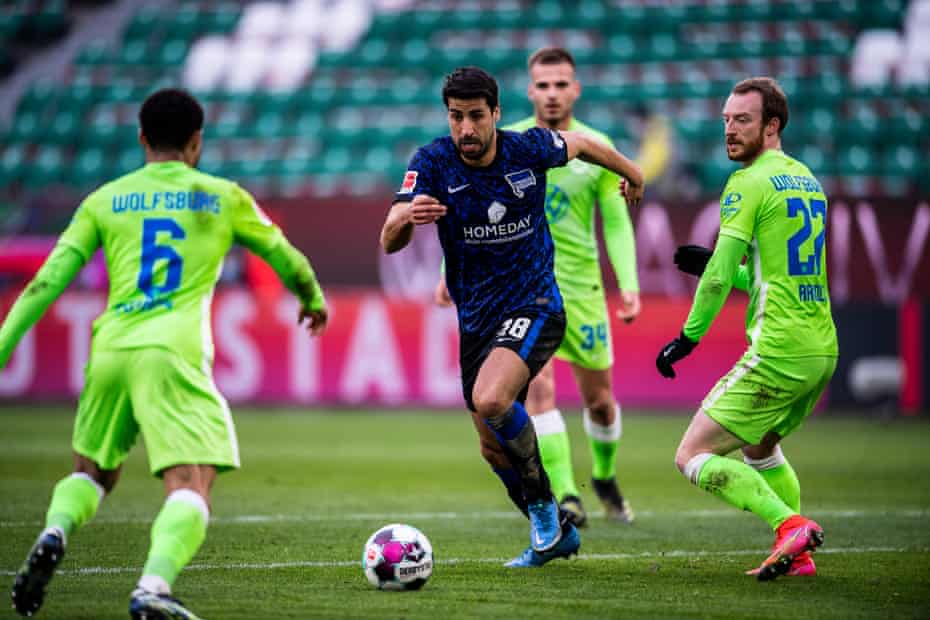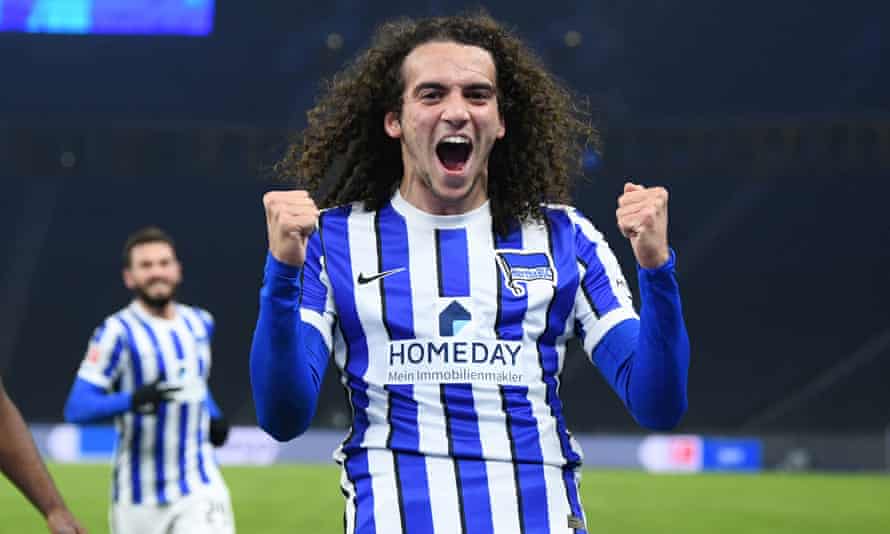It has been a rollercoaster few months for Arne Friedrich. The former Hertha Berlin defender won 82 caps for Germany, played at four major tournaments and made nearly 300 club appearances. But nothing could have prepared him for the role as Hertha’s sporting director after accepting the Bundesliga club’s offer in the summer of 2020.
Friedrich had been focusing on his From Done to Dare podcast and his Arne-Friedrich-foundation. In a frank interview, he tells us what he has learned and his aims for the rest of this season and beyond.
The Hertha project is both ambitious and complex given you are fighting to avoid relegation. We have a new investor who put in a lot of money and that is why everyone expects success from Hertha Berlin. But nothing is taken for granted, nothing is easy … the expectations are high, but we have to deal with reality. Now we are in a different position, we will work to transform this situation into an opportunity.
How will you go about this? There is a question to ask every time a problem arises: what can we learn from this situation? Many think we have a lot of money, a fantastic city like Berlin, an ambitious project and things come easily … instead in these difficult situations you understand who are the people you can really count on: a fundamental thing in life even more than in sport.
Did the call from Hertha Berlin surprise you? I was working and studying as an assistant coach, as well as covering games as a pundit. Then came the surprise call from Hertha in the summer: I love this club and they told me they needed me. I didn’t have much time to think about it or study this job, now I have a lot of responsibility and I’m ready to go.
What has been the hardest part of being sporting director in these first months? The terrible thing after so many years as a footballer is that I can’t do anything during matches! This is horrible, I would like to go on the field to help the team sometimes and instead I’m sitting in the stands [laughs]. My day is dedicated to Hertha, I wake up very early, make sure we work on every aspect of the club. I am new to this world, I have people I believe in beside me, I have formed my team. They work so hard to help me. It is a new scenario but it is a great journey, I’m sure we can build something important.

What is the basis of your football philosophy? In life, what matters is the character. Setting goals, always being very clear about what we want to achieve. We need to establish the club’s philosophy, what style of football we want to play, what imprint to give to our project. The city is extraordinary, the club is fantastic, we can rebuild something important. Psychology is the starting point and the key is the emotional regulation.
How does “emotional regulation” work? It seems something new to football in Europe. My mentor and dear friend, Dr John Ashley Null, taught me about the importance of emotional regulation: he changed my life because this is a fundamental part of our work at Hertha Berlin. In daily work within the club as well as in the choice of players to buy: the decision on the players is made on character as well as their skills.
This seems a radical departure for a club, especially Hertha? Yes, this aspect is underestimated in football. The qualities of the player are fundamental, but the psychological impact is equally so: happy players perform better. That’s the rule. If you have a problem off the pitch, it will also affect your performances. This part must be treated exactly as much as the football and technical part, taking care of what’s going on around you.
How do you develop emotional regulation? There is so much pressure in football, also at Hertha. What matters most is how people react to these high pressure situations. My goal is to develop character and help them deal with setbacks and life in general. Players are not robots, they have feelings and emotional needs. We want to support them, on and off the field, and help them focus on the joy of the game instead of the fear of losing. Football is a people business, what matters are the people. To care about the emotional needs is a chance to improve ourselves and understand who we are.
Do you have to hire specialists in this field? Yes, we need professionals to take care of this aspect. My dream is to have someone who totally cares about the player’s character. We are in the process, although we are not yet ready because my job at Hertha Berlin only started a few months ago.
During negotiations for a player, how do you manage emotional regulation? I’d rather have a skilful average footballer with high confidence in his potential rather than a very talented one with an unconvincing character. The character counts, not only the physical or technical abilities. Performance matters but inside of us there are things that happen and evolve every day … and we must also help the growth of young players’ emotional health, it is a form of respect for the boys even before the players.
Does this also mean looking for players with a winning mentality? Everything in life is self-confidence. The winning mentality is fundamental. We have to work on this, build a successful and talented team but also if you work honestly, and put everything you have into it, the results will come.
In January you bought Sami Khedira. How did that signing fit with your approach? Khedira is the perfect example of a winning mentality. The negotiation was not difficult: he wanted to have space after difficult months at Juventus, I played with Sami so I know him as a person, we played at the 2010 World Cup together in South Africa. He is a born leader and to rebuild a club you also need players who can help you in this process. Finding players with a winning mentality is fundamental for us. I am really happy to have him here in Berlin because he helps us a lot even off the pitch, when he is injured: at every training session, Khedira is teaching a winning mentality, I see the way the players watch him at the training ground … we have many talents but there is also a need for those who have the right experience to face any kind of situation.

You had to build a team in a very short time during the summer. It wasn’t easy. First of all, I wanted to select the people I believe in. Then it’s all based on the feeling: we will now have time to analyse the team, what we need in the long term, how to strengthen ourselves.
You suddenly found yourself in the crazy world of the transfer market: what surprised you? The agents. When I played football, in my entire career I only had one agent! Today the players have an agent, two intermediaries, you have to deal with all these people, but the important thing is to set the rules. Agents want to make money, and they deserve it if they do a good job. I care about the player. If it doesn’t suit the agent then: thank you, I’ll look for another player.

How does selling and buying players at a club like Hertha work? Even with the release clauses in the contracts? It works like shark’s teeth. You must always have the next one ready to bite. Take Bayer Leverkusen: they sold Julian Brandt and replaced him with Kai Havertz, and then they sold him too because they now have Florian Wirtz, another talent in the same position. This means creating value. This is why I am in favour of the release clauses. Football is also business, creating opportunities, thinking about what a footballer can give you, say, in two years. I certainly accept the clauses, it would be stupid not to. But they must always be used to plan for the future.
Is there a talent like that at Hertha? Luca Netz, left winger or left-back, huge talent. He was born in 2003 but he is already in the first team. We want Luca to sign a long contract, we are negotiating. We can help him grow in many ways, to take the next step and become a starting XI player. We need to focus on the academy, it is crucial for a club: it cannot be a secondary aspect.
Matteo Guendouzi had problems at Arsenal, how is it going for him at Hertha? When you talk about Guendouzi and see his skills, you realise that he is a great player. I’ve also read that he had problems at Arsenal but here he behaves very well. He puts all of himself on the field. He is a great professional. Guendouzi’s situation confirms that we must always understand how to help the players, with a talent like him it is worth it.
How much of the American mentality is there in your approach as sports director? So much. I love the United States, I played in MLS and it has changed my life. They were already amazing in terms of physical strength, now they have grown on a tactical and technical level. But the real example is in other American sports. I also look at American football, NFL, baseball. Americans care about knowledge. They are focused on the details. We need more specialists for individual areas. And then Americans are very attentive to emotional regulation, they try to give help: for them many things are important like nutrition, sleep and more. Most of the players could benefit from this.
What is your goal at Hertha Berlin? One of the best NFL coaches used to say that the goal is not only achieved when you win a trophy. I have another mission: I want to develop people. When I have to leave the club I want to have the right people on board, develop the characters of the players and whoever is at the club, improve every single person. Do an honest job and the results will come. I want to build character, improve young people, emotional regulation, motivation. This is the goal.
Sum up your thinking. The turning point comes when you understand that life is more than yourself. It’s not about me, it is about others. This is the goal. Don’t just ask yourself what you can do for yourself, but what you can do for others: when you understand how to help others and do something for others, you will have the benefit of having improved yourself, too. This is the key.
from Football | The Guardian https://ift.tt/3fJ4SrM
via IFTTT

No Comment